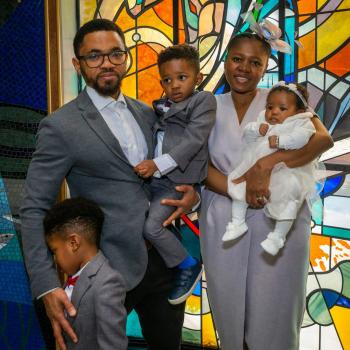Two authors take the opposite position and affirm the intrinsic goodness of loving homosexual relationships. The first is a Mainline Protestant counterpoint to Tremba. As Sharon Groves frames the decision, Protestant denominations must decide whether they will "stand with the gatekeepers" who keep the unwanted outside the church or "truly follow Jesus ministry and honor the spirit of love" by acknowledging and welcoming LGBT couples. Many persons of faith, she says, are passionately convinced "that marriage equality is theologically in keeping with the teachings of Jesus and, indeed, with the moral tenets of love and compassion found at the heart of all major religions."
Then there is Cory Ellen Gatrall, writing as a Pagan, who likewise focuses on the goodness of love in itself. Homosexuals find in Pagan traditions a "welcome spiritual home," she claims, because both homosexuals and Pagans have trod a "path from invisibility to pride, and from oppression to something approximating equality." Both have fought against prejudice to create a space for themselves legally and socially, and many Pagan traditions are strongly affirmative of homosexual unions. The only rule is love, Gatrall writes, so loving relationships of all kinds, heterosexual and homosexual alike, are deserving of respect and celebration.
Same-Sex Marriage and (Secular) Society
When it comes to the effect of same-sex marriage on society as a whole, the authors presented in the public square offer a variety of arguments. Rosemary Ruether, renowned Catholic feminist and professor of religion, rejects the notion that homosexual marriage threatens the institution of marriage. "The gay marriage movement is precisely a rejection of casual and plural relations," she writes. "It is an option for a committed, monogamous relation with one other beloved person for the rest of one's life." In this way the desire for same-sex marriage, and the legalization of it, represents the strongest possible affirmation of the institution of marriage and its enduring value.
Whatever the potential effect of legalizing gay marriage, Rabbi Steve Greenberg (the first openly gay Orthodox Rabbi) claims, religious norms of marriage cannot be imported into civil law without a violation of the separation of church and state. When the state determines that only some committed relationships merit the status and privileges of marriage, it effectively chooses one religious model of marriage over others. Also, in his response to Rabbi Weinreb, Greenberg writes that "Rabbi Weinreb's words are as strident as those of Evangelical Christians who are also insisting that their particular religious perspective be employed to ground the civil code."
Jason Pitzl-Waters, writing for the Pagan tradition, agrees that designating marriage as strictly heterosexual unfairly privileges the perspectives of some religious traditions over others. "The melding of a civil contract and (mainly Christian) religious ceremony in America has created the erroneous idea that the State should have some role in defining and blessing (with legal benefits) which two consenting adults should be able to be joined before their god(s)." The government should either "get out of the marriage game" or treat all marriages in the same way.
Timothy Dalrymple presents an Evangelical counter-argument. After all, he claims, it is not "the government" but the American people themselves, through democratic and representative means, who choose to legalize same-sex marriage or not. Evangelicals, like other religious and non-religious groups, have every right to shape the moral culture and legal structures of the society in which they and their children live. When the founders separated church and state, they did not mean that voters had to leave their religious convictions outside the ballot box.
None of the authors in the Public Square develops the argument that the legalization of same-sex marriage would lead to harmful consequences. However, the negative effects of discrimination against gays are made clear. Rashi Kesarwani writes about Parvez Sharma's documentary, A Jihad for Love, which follows gay Muslims and their struggles "to reconcile their faith with their sexuality, often in places where the basic human right of sexual expression is under attack." Since gays in some Muslim nations can be severely punished, even executed, many have sought asylum in the West. Yet in America, Sharma says, "the evangelical right-wing is as shrill in its condemnation of homosexuality and in its opposition, for example, to gay marriage...as are many Muslim clerics. How are they different?"





